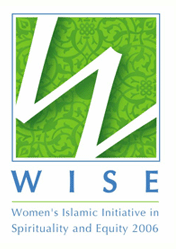This is a guest post by Dilshad D. Ali.
 In 2006 I received an invitation from Daisy Khan, founder of the American Society for Muslim Advancement to attend the first ever Women’s Islamic Initiative in Equity and Spirituality Conference (WISE) in New York City, where about 170 prominent Muslim women from more than 20 countries gathered to discuss issues important to them and figure out ways to better the situation of Muslim women the world over.
In 2006 I received an invitation from Daisy Khan, founder of the American Society for Muslim Advancement to attend the first ever Women’s Islamic Initiative in Equity and Spirituality Conference (WISE) in New York City, where about 170 prominent Muslim women from more than 20 countries gathered to discuss issues important to them and figure out ways to better the situation of Muslim women the world over.
I left that conference overwhelmed by the power of what I had witnessed and by the collective intelligence and influence of those women. I wrote a story for Beliefnet and moved on with my life. Occasionally I heard from WISE about what they were working on, but the group remained just a blip on my radar, until I got the invitation to attend the 2nd annual WISE (with the “E” now standing for equality rather than equity) conference in Kuala Lumpur.
So here I am in Kuala Lumpur attending the WISE conference (where I presented a case study the cache of content Beliefnet had developed on the topic of hijab and Muslim women’s dress code), and once again I’m overwhelmed by the more than 200 important Muslim women from more than 50 countries who have gathered to share their work, learn from each other, and learn what WISE has been up to in the field of Muslim women’s causes. It has been an enlightening two days thus far.
Instant polling on the first day revealed that these women felt that the biggest barrier to Muslim women’s advancement was harmful religious interpretation. And that point was driven home on Saturday during a session held about “change through interpretation, in which two women presented case studies about how they are working to improve marital rights and gender equality through scripture interpretation.
Laisa Alamia from the Philippines presented a very compelling case study of how her group, Nisa Ul Haqq Fi Bangsamoro is working to promote and train gender-sensitive Muslim religious leaders (or MRLs) in the Muslim province of Mindanao. Through her group’s painstaking efforts with some of the MRLs and other experts, they wrote 15 khutbas (sermons) that tackled issues of gender, domestic violence, marital rights of women, and reproductive health, which were then used by numerous imams and muftis in their Friday sermons. Currently Alamia is conducting on-the-ground data-taking to gauge the effectiveness of these khutbas on the dire condition of Moro Muslim women in Mindanao.
This session was followed by the WISE Shura Council’s launch of the “Jihad Against Violence” campaign-a global campaign to bring awareness to and help eradicate violence against Muslim women. Although conference participants debated hotly on the name of the campaign (Was the word “jihad” too fiery to use? Should it be called “Jihad for Peace”?), all joined in taking a pledge to campaign against violence towards Muslim women.
With so much coming out of day two, I am eager to see what happens during the rest of the conference. Stay tuned for more.
Dilshad D. Ali is a writer and former editor for Beliefnet, where she wrote a previous article on last year’s WISE conference in New York City. See the official WISE 2009 website for more details.

